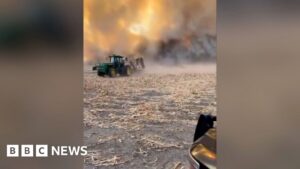Cuba in complete blackout after national electrical power grid fails | Cuba
Cuba’s entire national electrical grid has shut down after one of the island’s major power plants failed, Cuba’s energy ministry said, plunging the entire country into a blackout.
Earlier on Friday, the communist-run government had closed schools and non-essential industry and sent most state workers home in a last-ditch effort to keep the lights on for residents.
But shortly before midday, the Antonio Guiteras power plant, the country’s largest and most efficient, went offline, prompting a total grid failure and leaving approximately 10 million people without power.
“There will be no rest until [power] is restored,” the Cuban president, Miguel Díaz-Canel, said on X.
The crisis had already prompted officials to cancel all non-vital government services. Schools of all levels including universities, have been shuttered through Sunday. Recreational and cultural activities, including night clubs, were also ordered closed.
The government said only essential employees of the state-run food and healthcare industries should report to work on Friday.
Grid officials said they did not know how long it would take to re-establish service.
The crisis marks a new low on an island where life has become increasingly unbearable, with residents already suffering from shortages of food, fuel, water and medicine.
Virtually all commerce in Havana was shut down at midday on Friday. The hum of privately owned generators could be heard in some homes and restaurants, and many residents sat sweating on doorsteps with windows open as the sun broke through the clouds.
Cuba’s prime minister, Manuel Marrero, on Thursday blamed ongoing rolling blackouts during the past several weeks on a perfect storm well known to most Cubans: deteriorating infrastructure, fuel shortages and rising demand.
“The fuel shortage is the biggest factor,” Marrero said in a televised message that was garbled by technical difficulties and delayed by several hours.
Strong wind and heavy seas that began with Hurricane Milton last week have crippled the island’s ability to deliver scarce fuel from boats offshore to its power plants, officials said.
Cuba’s government also has long blamed the US cold war-era embargo, as well as a fresh round of sanctions under then president Donald Trump, for difficulties in acquiring fuel and spare parts to operate its oil-fired plants.
The island’s two largest power plants, Felton and the now-offline Antonio Guiteras, are both under-producing, the government said, and require immediate maintenance, part of a four-year plan to revitalize Cuba’s decrepit infrastructure.
Cuba’s fast-growing private businesses, which have contributed to increased demand on the island, will be charged higher rates for the energy they consume to compensate for shortfalls, Marrero said.
While demand for electricity grows, fuel supply has all but dried up on an island that produces comparatively little of its own.
Cuba’s largest oil supplier, Venezuela, has reduced shipments to the island to an average of 32,600 barrels a day in the first nine months of the year, about half of the 60,000 barrels a day sent in the same period of 2023, according to vessel-monitoring data and internal shipping documents from Venezuela’s state oil company, PDVSA.
PDVSA, whose refining infrastructure is also ailing, has this year tried to avoid a new wave of fuel scarcity at home, leaving smaller volumes available for export to allied countries like Cuba.
Russia and Mexico, which in the past have sent fuel to Cuba, have also greatly reduced shipments to the island.
The shortfalls have left Cuba to fend for itself on the far costlier spot market, at a time when its government is near bankrupt.
Electricity officials said they nonetheless expect power generation to improve in the coming days as the weather allows fuel from prior deliveries to be distributed around the Caribbean’s largest island.
#Cuba #complete #blackout #national #electrical #power #grid #fails #Cuba
News plays a pivotal role in our lives by keeping us informed and connected to the world. It serves as a critical source of information, offering updates on current events, politics, economics, science, and more. Through news, we gain awareness of global issues and local developments, helping us make informed decisions in our personal and professional lives. News also fosters discussion and debate, encouraging critical thinking and perspective-taking. Moreover, it promotes transparency and accountability among governments, businesses, and other institutions. In a rapidly changing world, staying updated with the news enables us to adapt to new challenges and opportunities, shaping our understanding of the complexities of society. Ultimately, news is not just about information; it empowers us to participate actively in the world around us, contributing to a more informed, engaged, and responsible global citizenry.
Health is fundamental to our well-being and quality of life, making it an essential aspect of daily existence. It encompasses physical, mental, and emotional aspects, influencing our ability to function effectively and enjoy life fully. Prioritizing health allows individuals to maintain optimal physical fitness, reducing the risk of diseases and promoting longevity. Mental health, equally crucial, affects our cognitive abilities, emotional stability, and overall happiness. Investing in preventive healthcare through exercise, balanced nutrition, and regular medical check-ups helps in early detection of potential health issues, ensuring timely intervention and treatment. Beyond individual benefits, a population’s health impacts societal productivity and economic stability. Governments and organizations worldwide emphasize public health initiatives to address pandemics, health disparities, and promote overall well-being. Ultimately, health serves as the foundation upon which we build our lives, influencing our ability to pursue goals, nurture relationships, and contribute meaningfully to society.
Money plays a crucial role in our lives as a means of financial security and freedom. It enables us to meet basic needs such as food, shelter, and healthcare, while also providing opportunities for education, travel, and personal growth. Beyond material comforts, money facilitates social connections and experiences that enrich our lives. It empowers individuals to invest in their futures, whether through savings, investments, or entrepreneurial ventures, thereby fostering economic stability and growth. However, the pursuit of wealth should also be balanced with ethical considerations, as money can influence relationships and societal dynamics. Responsible management of finances is key to achieving long-term goals and mitigating financial stress. Ultimately, while money is a tool for achieving aspirations and fulfilling desires, its true value lies in how it is utilized to improve both personal well-being and the broader community.
Earning Easy Money in 2024: Opportunities and Considerations 💸
In 2024, the landscape of earning easy money presents diverse opportunities, albeit with considerations. The digital age offers platforms for freelancing, online trading, and e-commerce, allowing individuals to leverage skills and creativity for financial gain. Cryptocurrency investments continue to allure with potential for quick profits, yet they entail high volatility and risk. Moreover, the rise of the gig economy enables flexible work arrangements through apps and websites, offering quick payouts but often without job security or benefits. Passive income streams such as rental properties and investments in stocks or bonds remain viable, but demand initial capital and ongoing management. Amid these options, caution is essential to avoid scams and unsustainable ventures promising overnight success. Ultimately, while the allure of easy money persists, informed decisions, diligence, and a long-term perspective are crucial for sustainable financial growth and security in the dynamic year ahead.





